
EmotiVoice
EmotiVoice 😊: a Multi-Voice and Prompt-Controlled TTS Engine
Stars: 6695
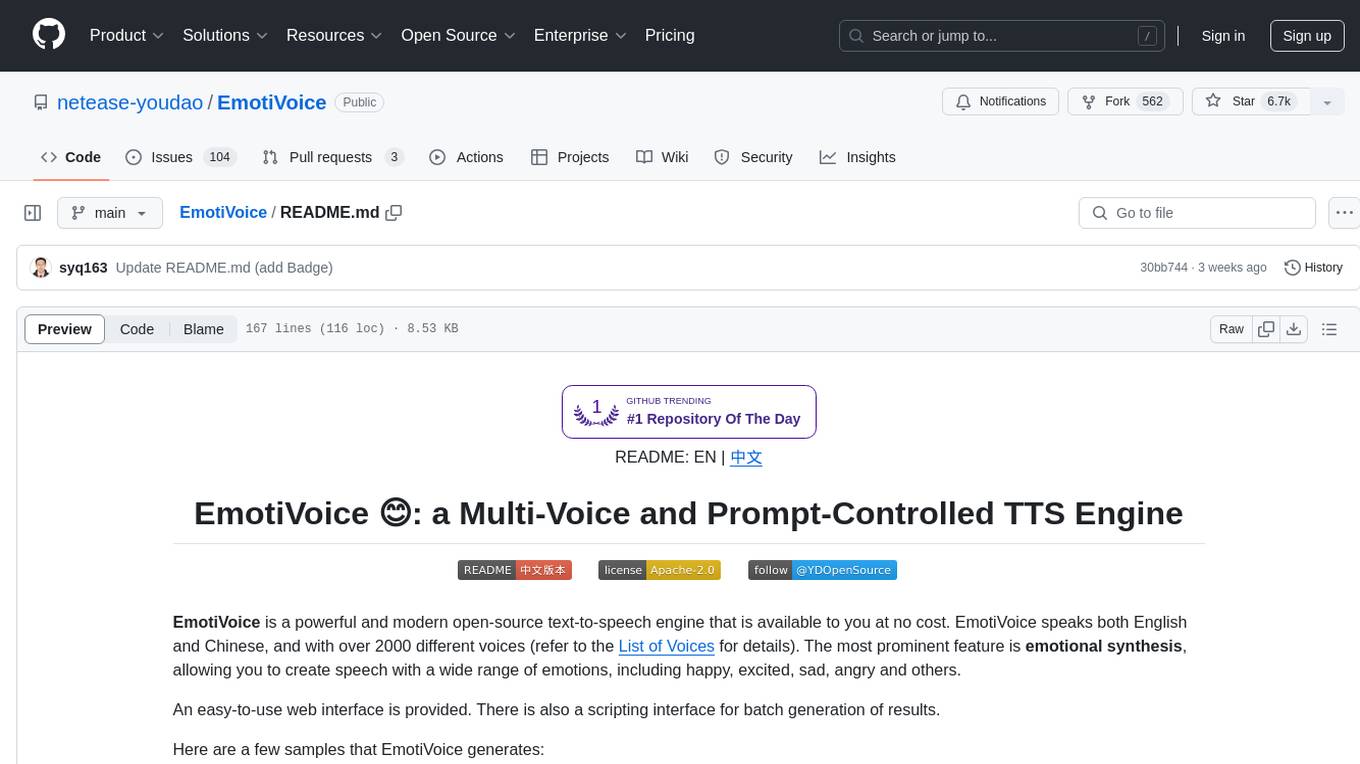
EmotiVoice is a powerful and modern open-source text-to-speech engine that supports emotional synthesis, enabling users to create speech with a wide range of emotions such as happy, excited, sad, and angry. It offers over 2000 different voices in both English and Chinese. Users can access EmotiVoice through an easy-to-use web interface or a scripting interface for batch generation of results. The tool is continuously evolving with new features and updates, prioritizing community input and user feedback.
README:
EmotiVoice is a powerful and modern open-source text-to-speech engine that is available to you at no cost. EmotiVoice speaks both English and Chinese, and with over 2000 different voices (refer to the List of Voices for details). The most prominent feature is emotional synthesis, allowing you to create speech with a wide range of emotions, including happy, excited, sad, angry and others.
An easy-to-use web interface is provided. There is also a scripting interface for batch generation of results.
Here are a few samples that EmotiVoice generates:
A demo is hosted on Replicate, EmotiVoice.
-
[x] Tuning voice speed is now supported in 'OpenAI-compatible-TTS API', thanks to @john9405. #90 #67 #77
-
[x] The EmotiVoice app for Mac was released on December 28th, 2023. Just download and taste EmotiVoice's offerings!
-
[x] The EmotiVoice HTTP API was released on December 6th, 2023. Easier to start, faster to use, and with over 13,000 free calls. Additionally, users can explore more captivating voices provided by Zhiyun.
-
[x] Voice Cloning with your personal data has been released on December 13th, 2023, along with DataBaker Recipe and LJSpeech Recipe.
EmotiVoice prioritizes community input and user requests. We welcome your feedback!
The easiest way to try EmotiVoice is by running the docker image. You need a machine with a NVidia GPU. If you have not done so, set up NVidia container toolkit by following the instructions for Linux or Windows WSL2. Then EmotiVoice can be run with,
docker run -dp 127.0.0.1:8501:8501 syq163/emoti-voice:latestThe Docker image was updated on January 4th, 2024. If you have an older version, please update it by running the following commands:
docker pull syq163/emoti-voice:latest
docker run -dp 127.0.0.1:8501:8501 -p 127.0.0.1:8000:8000 syq163/emoti-voice:latestNow open your browser and navigate to http://localhost:8501 to start using EmotiVoice's powerful TTS capabilities.
Starting from this version, the 'OpenAI-compatible-TTS API' is now accessible via http://localhost:8000/.
conda create -n EmotiVoice python=3.8 -y
conda activate EmotiVoice
pip install torch torchaudio
pip install numpy numba scipy transformers soundfile yacs g2p_en jieba pypinyin pypinyin_dictWe recommend that users refer to the wiki page How to download the pretrained model files if they encounter any issues.
git lfs install
git lfs clone https://huggingface.co/WangZeJun/simbert-base-chinese WangZeJun/simbert-base-chineseor, you can run:
git clone https://www.modelscope.cn/syq163/WangZeJun.git- You can download the pretrained models by simply running the following command:
git clone https://www.modelscope.cn/syq163/outputs.git- The inference text format is
<speaker>|<style_prompt/emotion_prompt/content>|<phoneme>|<content>.
- inference text example:
8051|Happy|<sos/eos> [IH0] [M] [AA1] [T] engsp4 [V] [OY1] [S] engsp4 [AH0] engsp1 [M] [AH1] [L] [T] [IY0] engsp4 [V] [OY1] [S] engsp1 [AE1] [N] [D] engsp1 [P] [R] [AA1] [M] [P] [T] engsp4 [K] [AH0] [N] [T] [R] [OW1] [L] [D] engsp1 [T] [IY1] engsp4 [T] [IY1] engsp4 [EH1] [S] engsp1 [EH1] [N] [JH] [AH0] [N] . <sos/eos>|Emoti-Voice - a Multi-Voice and Prompt-Controlled T-T-S Engine.
-
You can get phonemes by
python frontend.py data/my_text.txt > data/my_text_for_tts.txt. -
Then run:
TEXT=data/inference/text
python inference_am_vocoder_joint.py \
--logdir prompt_tts_open_source_joint \
--config_folder config/joint \
--checkpoint g_00140000 \
--test_file $TEXTthe synthesized speech is under outputs/prompt_tts_open_source_joint/test_audio.
- Or if you just want to use the interactive TTS demo page, run:
pip install streamlit
streamlit run demo_page.pyThanks to @lewangdev for adding an OpenAI compatible API #60. To set it up, use the following command:
pip install fastapi pydub uvicorn[standard] pyrubberband
uvicorn openaiapi:app --reloadYou may find more information from our wiki page.
Voice Cloning with your personal data has been released on December 13th, 2023.
- Our future plan can be found in the ROADMAP file.
- The current implementation focuses on emotion/style control by prompts. It uses only pitch, speed, energy, and emotion as style factors, and does not use gender. But it is not complicated to change it to style/timbre control.
- Suggestions are welcome. You can file issues or @ydopensource on twitter.
Welcome to scan the QR code below and join the WeChat group.
- PromptTTS. The PromptTTS paper is a key basis of this project.
- LibriTTS. The LibriTTS dataset is used in training of EmotiVoice.
- HiFiTTS. The HiFi TTS dataset is used in training of EmotiVoice.
- ESPnet.
- WeTTS
- HiFi-GAN
- Transformers
- tacotron
- KAN-TTS
- StyleTTS
- Simbert
- cn2an. EmotiVoice incorporates cn2an for number processing.
EmotiVoice is provided under the Apache-2.0 License - see the LICENSE file for details.
The interactive page is provided under the User Agreement file.
For Tasks:
Click tags to check more tools for each tasksFor Jobs:
Alternative AI tools for EmotiVoice
Similar Open Source Tools

EmotiVoice
EmotiVoice is a powerful and modern open-source text-to-speech engine that supports emotional synthesis, enabling users to create speech with a wide range of emotions such as happy, excited, sad, and angry. It offers over 2000 different voices in both English and Chinese. Users can access EmotiVoice through an easy-to-use web interface or a scripting interface for batch generation of results. The tool is continuously evolving with new features and updates, prioritizing community input and user feedback.
BizyAir
BizyAir is a collection of ComfyUI nodes that help users overcome environmental and hardware limitations to generate high-quality content. It includes features such as ControlNet preprocessing, image background removal, photo-quality image generation, and animation super-resolution. Users can run ComfyUI anywhere without worrying about hardware requirements. Installation methods include using ComfyUI Manager, Comfy CLI, downloading standalone packages for Windows, or cloning the BizyAir repository into the custom_nodes subdirectory of ComfyUI.
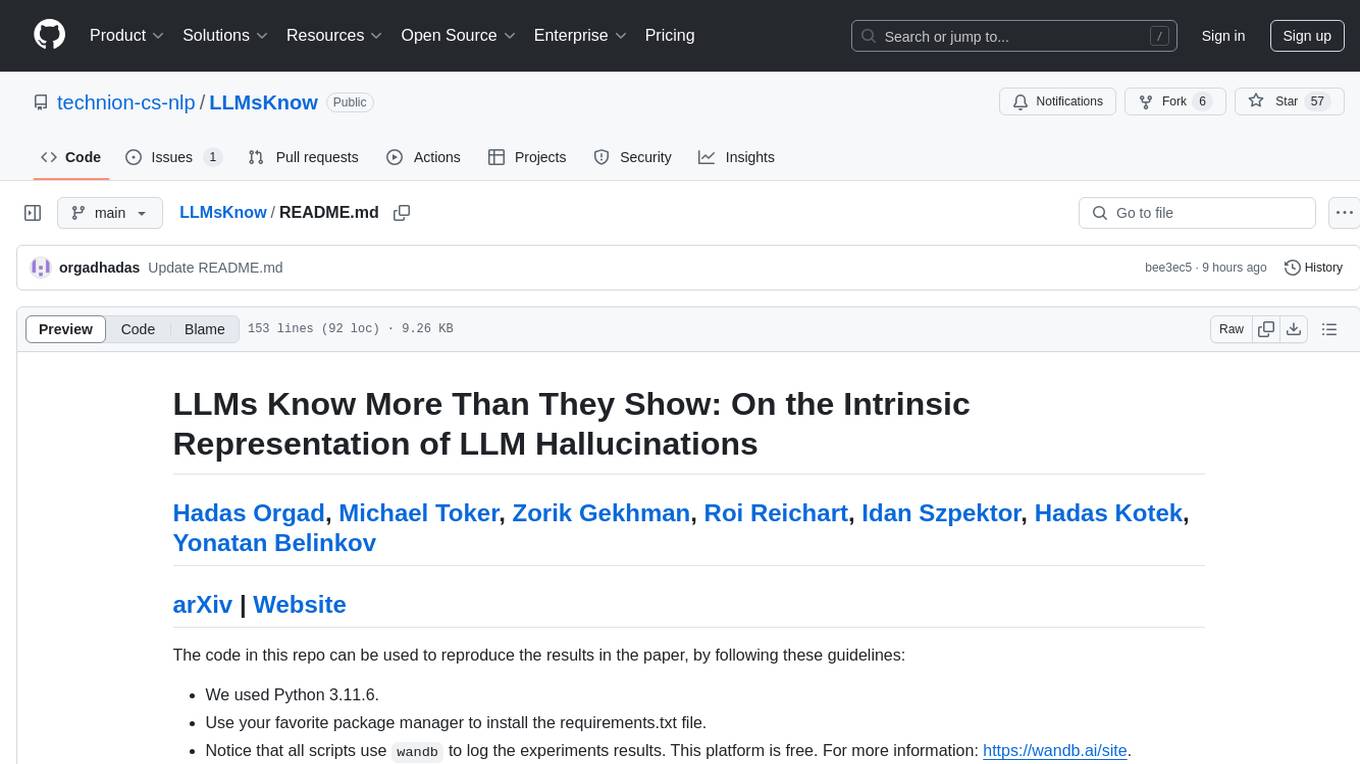
LLMsKnow
LLMs Know More Than They Show is a repository containing code to reproduce the results in the paper. It includes scripts to generate model answers, extract exact answers, probe all layers and tokens, probe specific layers and tokens, conduct generalization experiments, perform resampling for error type probing and answer selection experiments, and run other baselines like logprob detection and p_true detection. The repository supports various datasets such as TriviaQA, Movies, HotpotQA, Winobias, Winogrande, NLI, IMDB, Math, and Natural questions. It also provides supported models like Mistral-7B-Instruct-v0.2, Mistral-7B-v0.3, Meta-Llama-3-8B, and Meta-Llama-3-8B-Instruct.
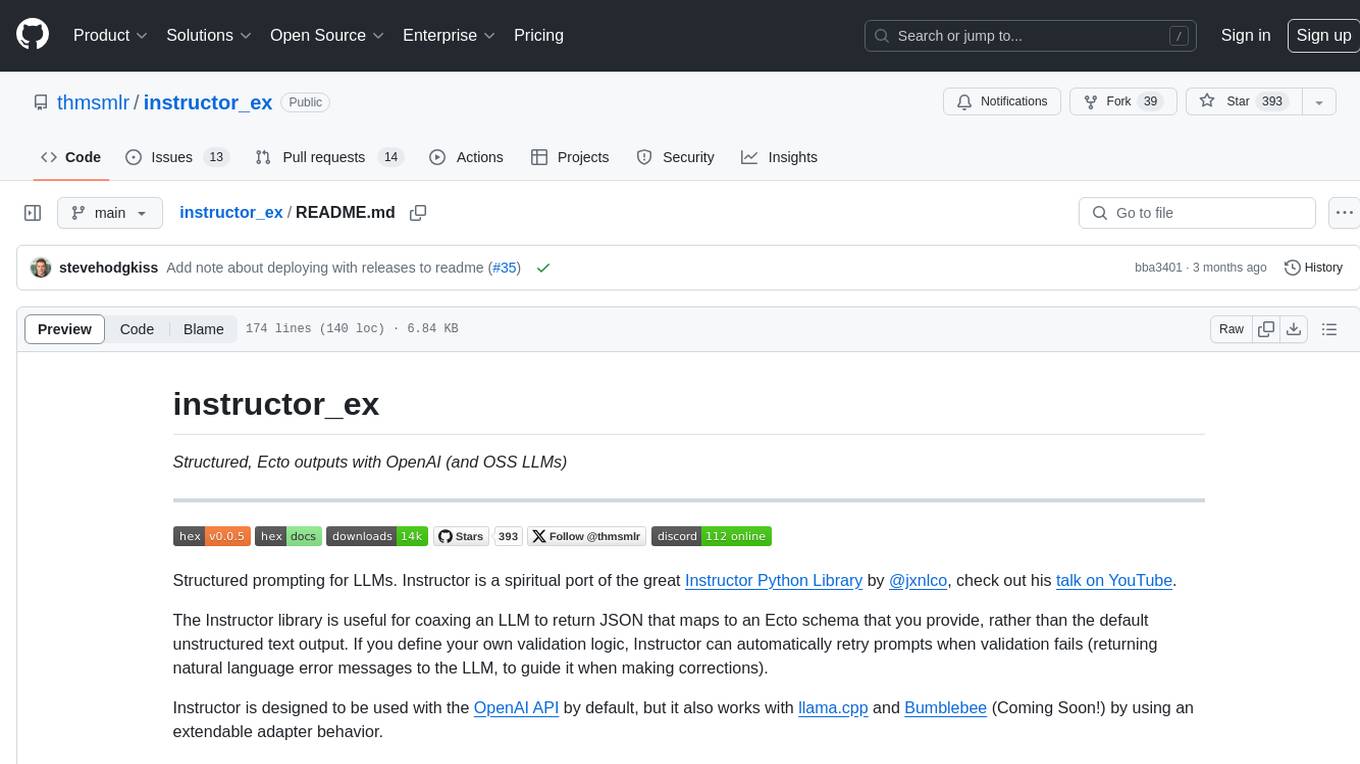
instructor_ex
Instructor is a tool designed to structure outputs from OpenAI and other OSS LLMs by coaxing them to return JSON that maps to a provided Ecto schema. It allows for defining validation logic to guide LLMs in making corrections, and supports automatic retries. Instructor is primarily used with the OpenAI API but can be extended to work with other platforms. The tool simplifies usage by creating an ecto schema, defining a validation function, and making calls to chat_completion with instructions for the LLM. It also offers features like max_retries to fix validation errors iteratively.

opencompass
OpenCompass is a one-stop platform for large model evaluation, aiming to provide a fair, open, and reproducible benchmark for large model evaluation. Its main features include: * Comprehensive support for models and datasets: Pre-support for 20+ HuggingFace and API models, a model evaluation scheme of 70+ datasets with about 400,000 questions, comprehensively evaluating the capabilities of the models in five dimensions. * Efficient distributed evaluation: One line command to implement task division and distributed evaluation, completing the full evaluation of billion-scale models in just a few hours. * Diversified evaluation paradigms: Support for zero-shot, few-shot, and chain-of-thought evaluations, combined with standard or dialogue-type prompt templates, to easily stimulate the maximum performance of various models. * Modular design with high extensibility: Want to add new models or datasets, customize an advanced task division strategy, or even support a new cluster management system? Everything about OpenCompass can be easily expanded! * Experiment management and reporting mechanism: Use config files to fully record each experiment, and support real-time reporting of results.
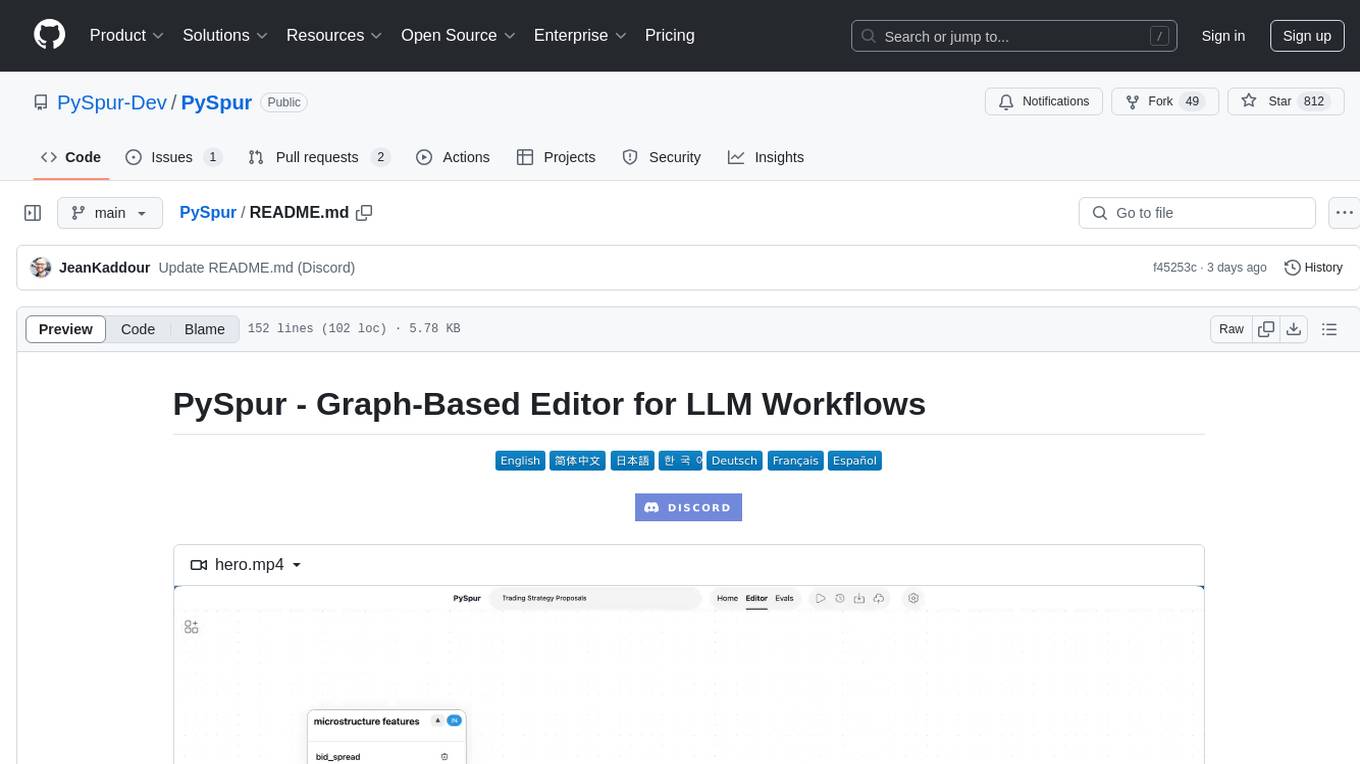
PySpur
PySpur is a graph-based editor designed for LLM workflows, offering modular building blocks for easy workflow creation and debugging at node level. It allows users to evaluate final performance and promises self-improvement features in the future. PySpur is easy-to-hack, supports JSON configs for workflow graphs, and is lightweight with minimal dependencies, making it a versatile tool for workflow management in the field of AI and machine learning.
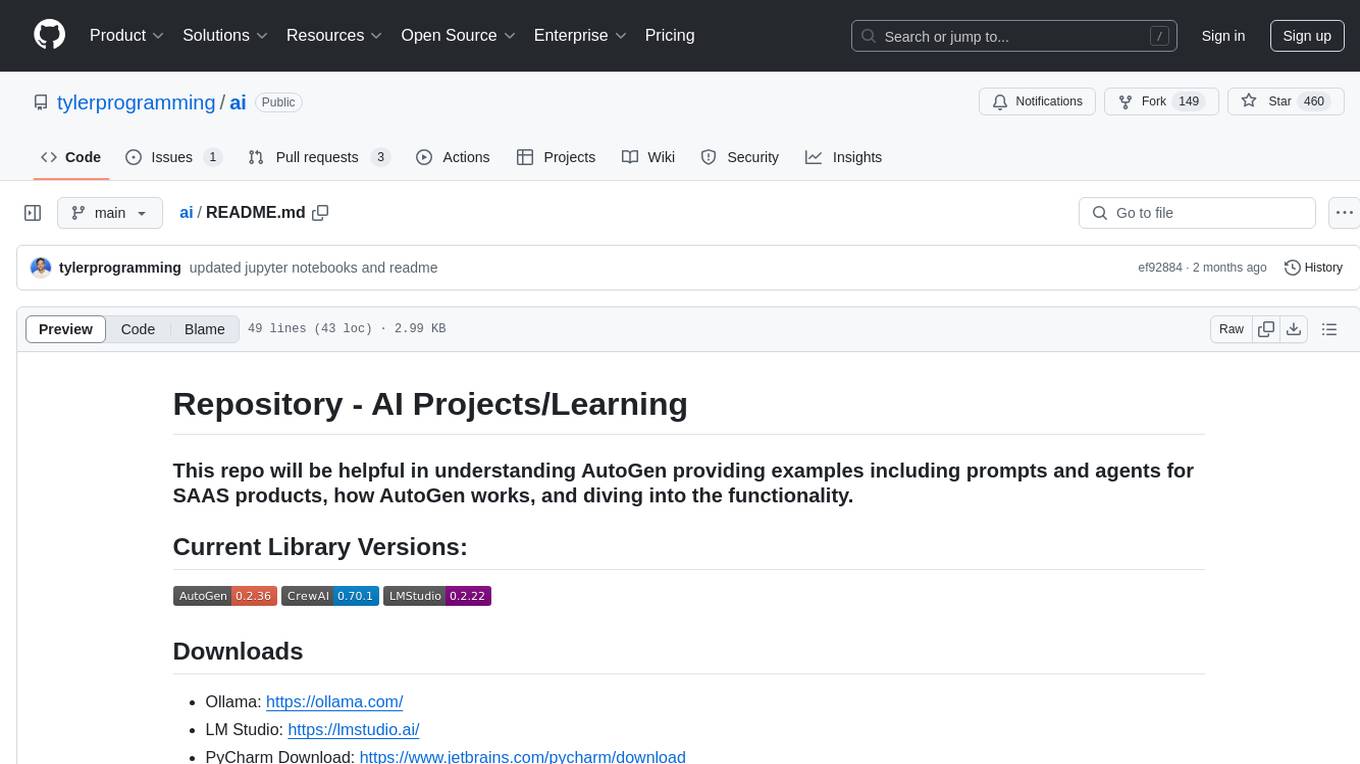
ai
This repository contains examples and resources for understanding AutoGen, including prompts and agents for SAAS products. It provides insights into how AutoGen works and its functionality. The repository also includes information on related tools and libraries, such as CrewAI and LMStudio. Users can explore various projects and ideas related to AI, including GPT-4 Vision, AutoGen with TeachableAgent, Auto Generated Agent Chat, WebScraper with Puppeteer, Fitness Tracker with LMStudio, and more. The repository aims to support users in developing AI projects and learning about different AI applications.

refact-lsp
Refact Agent is a small executable written in Rust as part of the Refact Agent project. It lives inside your IDE to keep AST and VecDB indexes up to date, supporting connection graphs between definitions and usages in popular programming languages. It functions as an LSP server, offering code completion, chat functionality, and integration with various tools like browsers, databases, and debuggers. Users can interact with it through a Text UI in the command line.
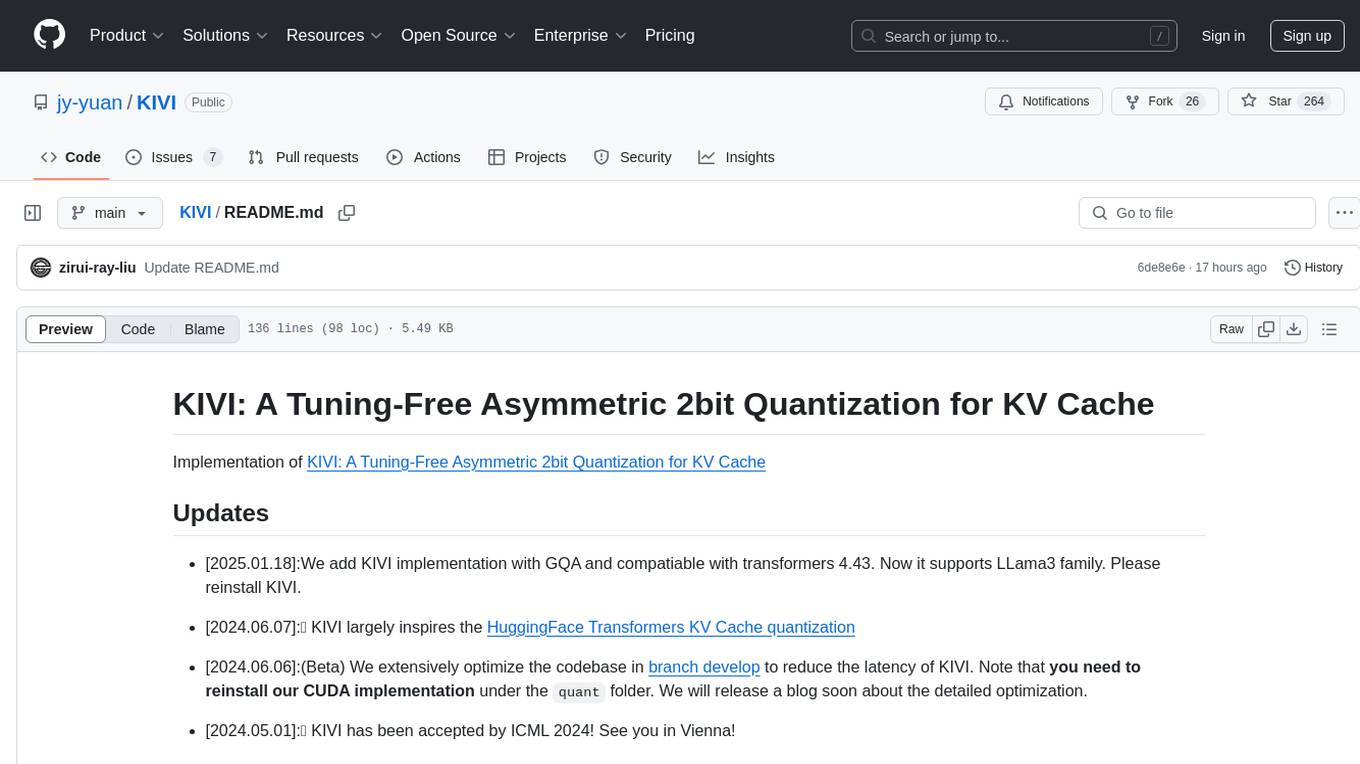
KIVI
KIVI is a plug-and-play 2bit KV cache quantization algorithm optimizing memory usage by quantizing key cache per-channel and value cache per-token to 2bit. It enables LLMs to maintain quality while reducing memory usage, allowing larger batch sizes and increasing throughput in real LLM inference workloads.
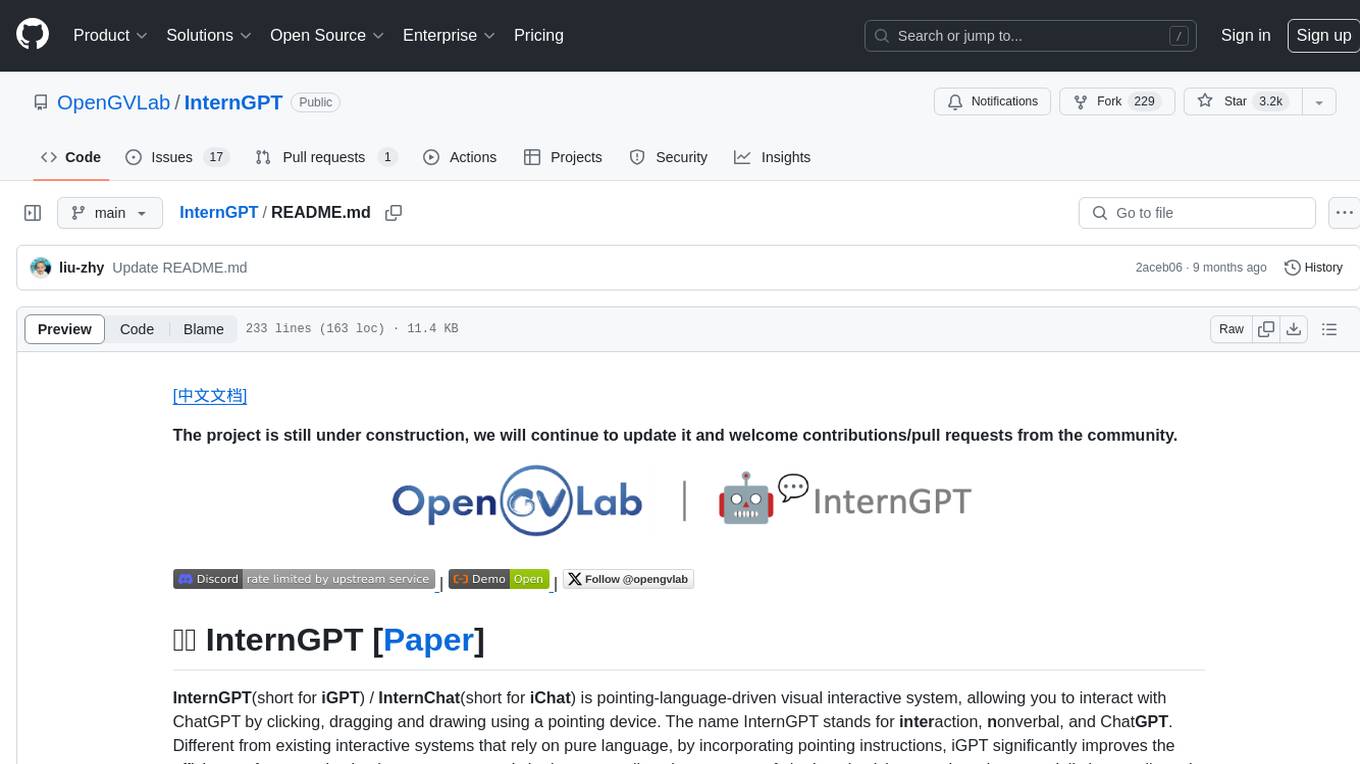
InternGPT
InternGPT (iGPT) is a pointing-language-driven visual interactive system that enhances communication between users and chatbots by incorporating pointing instructions. It improves chatbot accuracy in vision-centric tasks, especially in complex visual scenarios. The system includes an auxiliary control mechanism to enhance the control capability of the language model. InternGPT features a large vision-language model called Husky, fine-tuned for high-quality multi-modal dialogue. Users can interact with ChatGPT by clicking, dragging, and drawing using a pointing device, leading to efficient communication and improved chatbot performance in vision-related tasks.
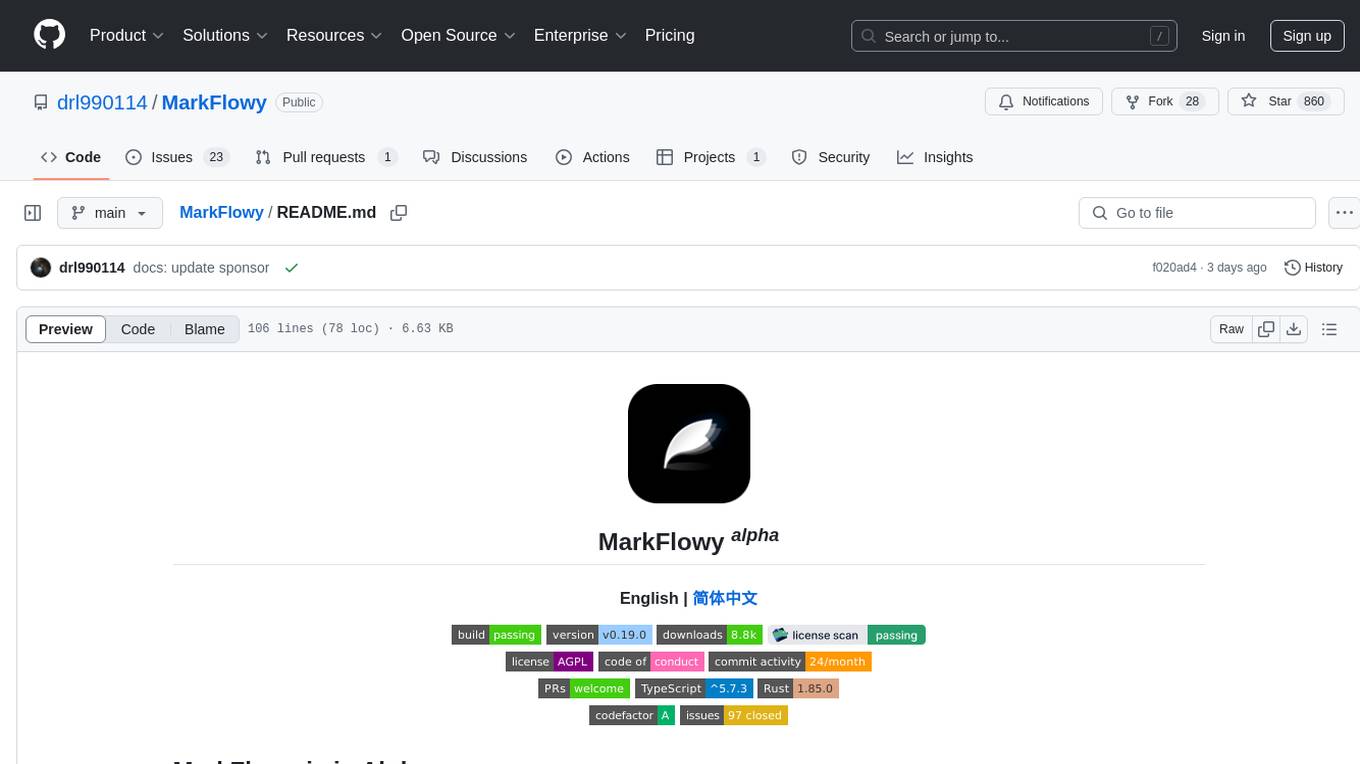
MarkFlowy
MarkFlowy is a lightweight and feature-rich Markdown editor with built-in AI capabilities. It supports one-click export of conversations, translation of articles, and obtaining article abstracts. Users can leverage large AI models like DeepSeek and Chatgpt as intelligent assistants. The editor provides high availability with multiple editing modes and custom themes. Available for Linux, macOS, and Windows, MarkFlowy aims to offer an efficient, beautiful, and data-safe Markdown editing experience for users.
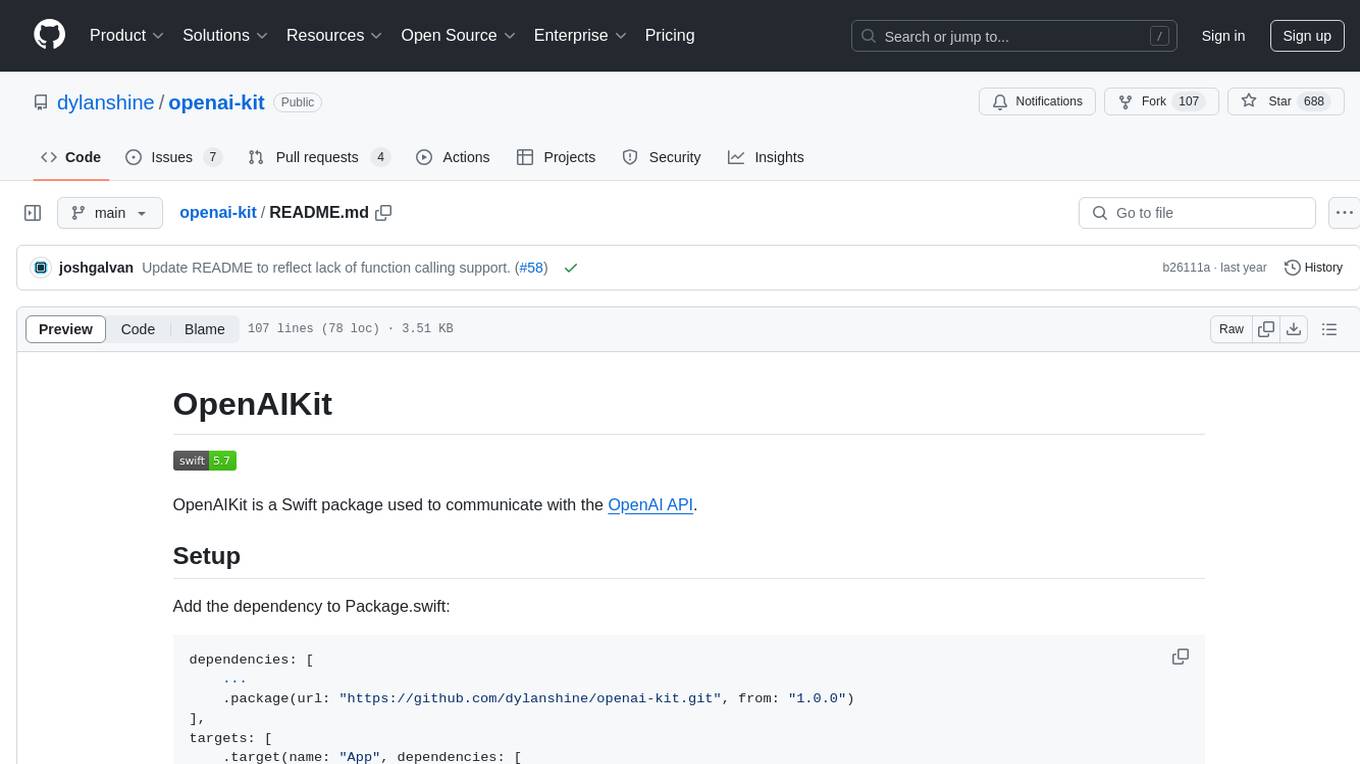
openai-kit
OpenAIKit is a Swift package designed to facilitate communication with the OpenAI API. It provides methods to interact with various OpenAI services such as chat, models, completions, edits, images, embeddings, files, moderations, and speech to text. The package encourages the use of environment variables to securely inject the OpenAI API key and organization details. It also offers error handling for API requests through the `OpenAIKit.APIErrorResponse`.
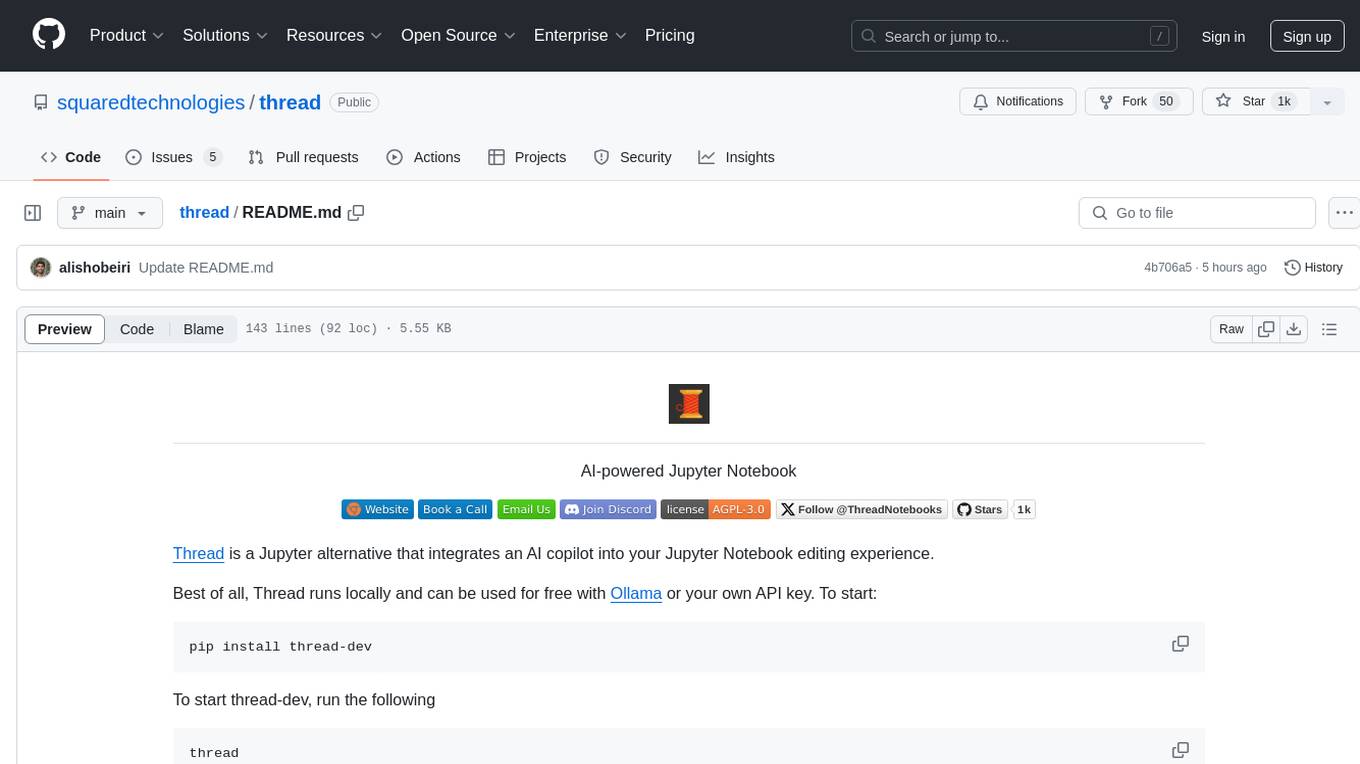
thread
Thread is an AI-powered Jupyter alternative that integrates an AI copilot into your editing experience. It offers a familiar Jupyter Notebook editing experience with features like natural language code edits, generating cells to answer questions, context-aware chat sidebar, and automatic error explanations or fixes. The tool aims to enhance code editing and data exploration by providing a more interactive and intuitive experience for users. Thread can be used for free with Ollama or your own API key, and it runs locally for convenience and privacy.
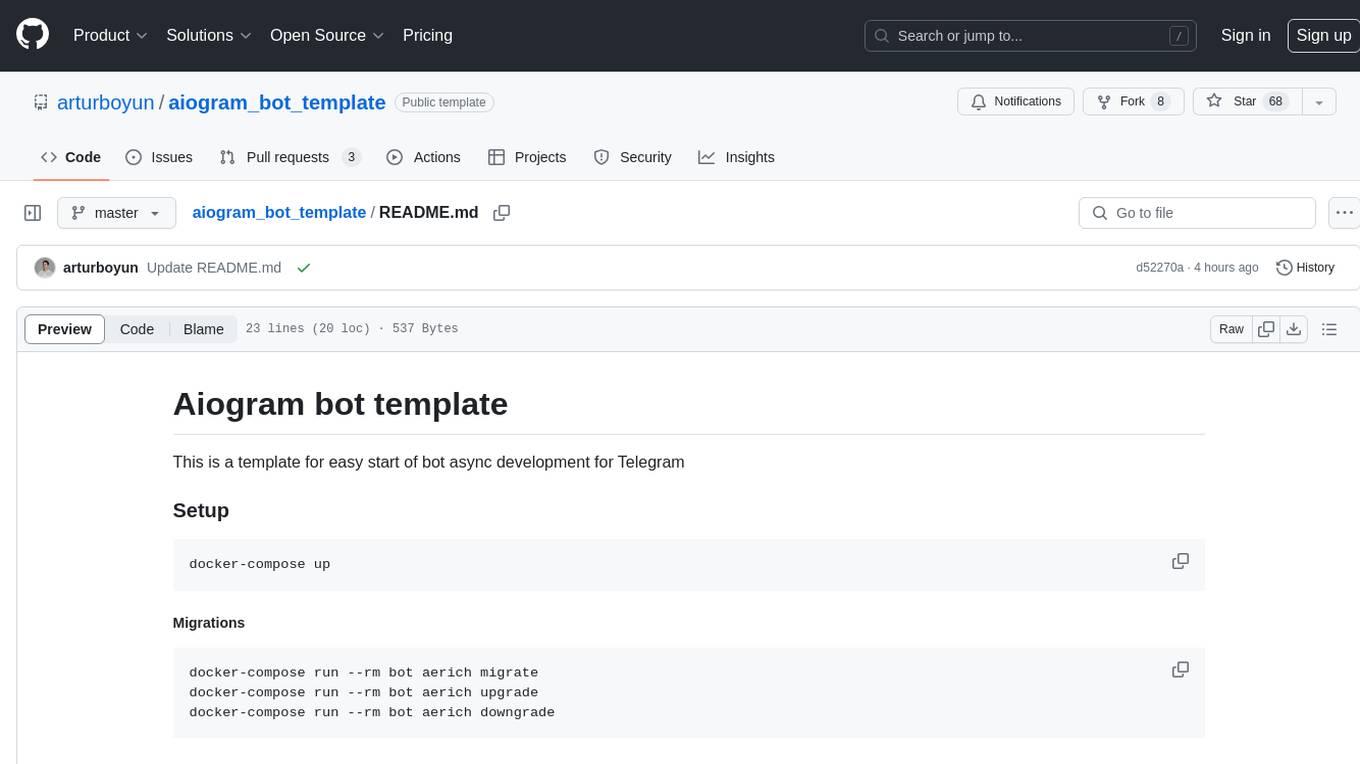
aiogram_bot_template
This repository provides a template for easy asynchronous bot development for Telegram using Aiogram library. It includes setup instructions using Docker Compose, migration commands for TortoiseORM, and examples for working with TortoiseORM. The template aims to simplify the process of creating Telegram bots with features like FastAPI integration and Docker Compose setup. The repository also includes a list of tasks to be completed, such as changing SQLAlchemy to TortoiseORM, adding FastAPI for webhook, and setting up CI/CD examples.
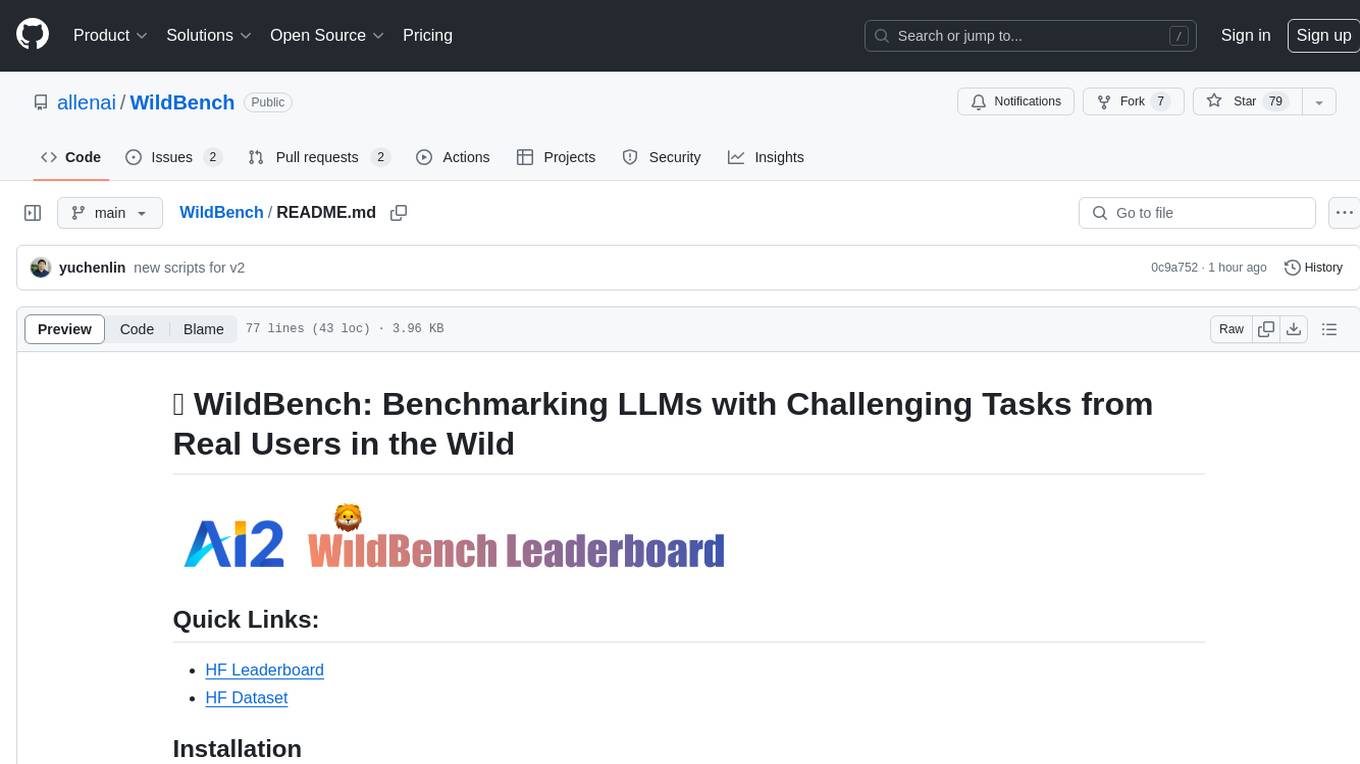
WildBench
WildBench is a tool designed for benchmarking Large Language Models (LLMs) with challenging tasks sourced from real users in the wild. It provides a platform for evaluating the performance of various models on a range of tasks. Users can easily add new models to the benchmark by following the provided guidelines. The tool supports models from Hugging Face and other APIs, allowing for comprehensive evaluation and comparison. WildBench facilitates running inference and evaluation scripts, enabling users to contribute to the benchmark and collaborate on improving model performance.
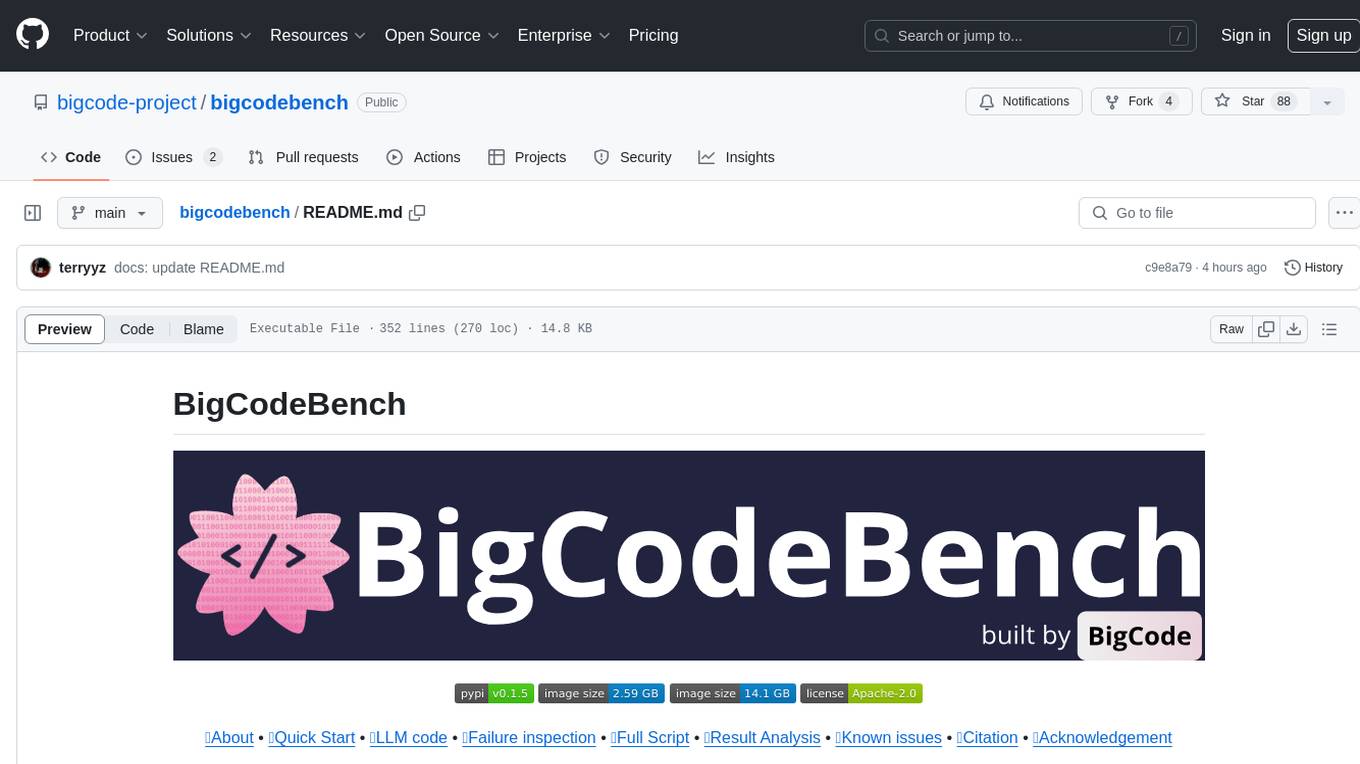
bigcodebench
BigCodeBench is an easy-to-use benchmark for code generation with practical and challenging programming tasks. It aims to evaluate the true programming capabilities of large language models (LLMs) in a more realistic setting. The benchmark is designed for HumanEval-like function-level code generation tasks, but with much more complex instructions and diverse function calls. BigCodeBench focuses on the evaluation of LLM4Code with diverse function calls and complex instructions, providing precise evaluation & ranking and pre-generated samples to accelerate code intelligence research. It inherits the design of the EvalPlus framework but differs in terms of execution environment and test evaluation.
For similar tasks

EmotiVoice
EmotiVoice is a powerful and modern open-source text-to-speech engine that supports emotional synthesis, enabling users to create speech with a wide range of emotions such as happy, excited, sad, and angry. It offers over 2000 different voices in both English and Chinese. Users can access EmotiVoice through an easy-to-use web interface or a scripting interface for batch generation of results. The tool is continuously evolving with new features and updates, prioritizing community input and user feedback.
For similar jobs

LLMStack
LLMStack is a no-code platform for building generative AI agents, workflows, and chatbots. It allows users to connect their own data, internal tools, and GPT-powered models without any coding experience. LLMStack can be deployed to the cloud or on-premise and can be accessed via HTTP API or triggered from Slack or Discord.

daily-poetry-image
Daily Chinese ancient poetry and AI-generated images powered by Bing DALL-E-3. GitHub Action triggers the process automatically. Poetry is provided by Today's Poem API. The website is built with Astro.

exif-photo-blog
EXIF Photo Blog is a full-stack photo blog application built with Next.js, Vercel, and Postgres. It features built-in authentication, photo upload with EXIF extraction, photo organization by tag, infinite scroll, light/dark mode, automatic OG image generation, a CMD-K menu with photo search, experimental support for AI-generated descriptions, and support for Fujifilm simulations. The application is easy to deploy to Vercel with just a few clicks and can be customized with a variety of environment variables.

SillyTavern
SillyTavern is a user interface you can install on your computer (and Android phones) that allows you to interact with text generation AIs and chat/roleplay with characters you or the community create. SillyTavern is a fork of TavernAI 1.2.8 which is under more active development and has added many major features. At this point, they can be thought of as completely independent programs.

Twitter-Insight-LLM
This project enables you to fetch liked tweets from Twitter (using Selenium), save it to JSON and Excel files, and perform initial data analysis and image captions. This is part of the initial steps for a larger personal project involving Large Language Models (LLMs).

AISuperDomain
Aila Desktop Application is a powerful tool that integrates multiple leading AI models into a single desktop application. It allows users to interact with various AI models simultaneously, providing diverse responses and insights to their inquiries. With its user-friendly interface and customizable features, Aila empowers users to engage with AI seamlessly and efficiently. Whether you're a researcher, student, or professional, Aila can enhance your AI interactions and streamline your workflow.

ChatGPT-On-CS
This project is an intelligent dialogue customer service tool based on a large model, which supports access to platforms such as WeChat, Qianniu, Bilibili, Douyin Enterprise, Douyin, Doudian, Weibo chat, Xiaohongshu professional account operation, Xiaohongshu, Zhihu, etc. You can choose GPT3.5/GPT4.0/ Lazy Treasure Box (more platforms will be supported in the future), which can process text, voice and pictures, and access external resources such as operating systems and the Internet through plug-ins, and support enterprise AI applications customized based on their own knowledge base.

obs-localvocal
LocalVocal is a live-streaming AI assistant plugin for OBS that allows you to transcribe audio speech into text and perform various language processing functions on the text using AI / LLMs (Large Language Models). It's privacy-first, with all data staying on your machine, and requires no GPU, cloud costs, network, or downtime.


